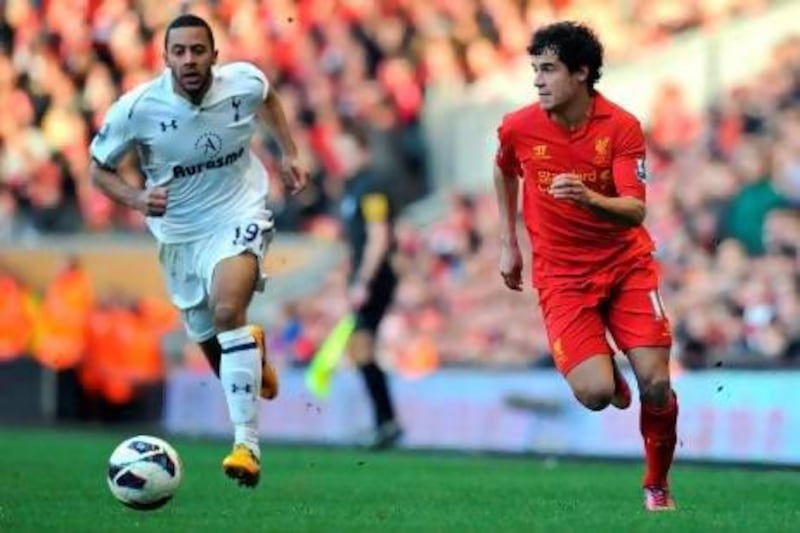If Philippe Coutinho were not so buoyed by the start he has made in English football, these last 10 days might have been spent in gloomy reflection on what might have been.
International weeks can feel lonely for those whose ambitions with their countries are unfulfilled, postponed, or left in limbo. For Coutinho, Brazil and the World Cup it hosts next year have long been a dream, one that used to seem his destiny.
Early in his teens, Liverpool's new signing would have been forgiven for assuming he had been born to play a central part at the 2014 World Cup, which will kick off on his 22nd birthday.
When Brazil won the right to stage the tournament, six years ago, he was emerging in the national age-group teams as a future superstar. Coutinho, or "Philippinho", or just "Cou", would be spoken of in the same breath as Neymar, with whom he formed a friendship and a finessed understanding for Under 16 and U17 sides on the pitch. Both exuded a precocious confidence in the range and technical excellence of their game. Suffice to say, the progress of Neymar has been the more stellar. It is Neymar who will be the local poster boy next summer.
But Coutinho may yet be involved. A chance to catch the eye of Brazil's coach, Luis Felipe Scolari, over the next 12 months was among the aims when the tousle-haired Coutinho - unlike Neymar, he is not a footballer who spends much cultivating his coiffure - approved his January move from Inter Milan to an English club with plenty of global renown, a glittering history of success but a recent record of uncertainty in the direction it was heading.
Should he continue for Liverpool with the spark he has shown in his first two months there, Scolari will be compelled to invite him to audition. Coutinho has one senior cap so far, from a distant three years ago.
Coutinho's impact at Anfield has been instant: five matches played, two goals and a pair of assists. His first start in the Premier League ushered in Liverpool's best sequence of results this season, until defeat against Southampton.
His anticipation of the runs made by the prolific Luis Suarez suggested the two South Americans might form an influential tandem. He is two-footed, nimble in possession and handy with a direct free kick. Steven Gerrard, the Liverpool captain, has praised Coutinho's "moments of brilliance". The player himself talked of the ease in which he has been made to feel at home.
At Inter, it had been harder to feel settled. Coutinho had been tied to the Italian club since they secured the future of a 16-year-old attacking midfielder whose early promise had attracted wide interest from Europe. His first professional club, Vasco da Gama, reported Real Madrid to Fifa for an illegal approach when Coutinho was still of school age. When Vasco made a deal worth nearly €4m with Inter, he was still more than a year shy of his 18th birthday, after which he was permitted to move permanently to Serie A.
He did so in the summer of 2010. He was joining a club celebrating its most successful year since the 1960s, an Inter who had just won the treble of Uefa Champions League, Serie A and Coppa Italia. The small, slight teenager entered a dressing room of hardened veterans.
He needed allies. Lucio, the experienced Brazilian defender, became a guardian. The new coach, Rafa Benitez, also showed confidence in a player described by club president Massimo Moratti as "the future of Inter".
Moratti's vision of who should shape that future, though, was erratic. Coutinho may have joined a group of champions, but he was also a young man signing up to one of European football's most neurotic institutions.
Benitez clashed with senior players as he carried out what he assumed was a mandate to rejuvenate an ageing team. The coach departed a few days after Inter won the Club World Cup in Abu Dhabi, ending a six-month tenure. Managerial turmoil would become part of the landscape during Coutinho's two and half years as an Inter employee; he worked with five coaches while he was there.
Under Leonardo, who followed Benitez, Coutinho enjoyed a few impressive nights, notably a performance of poise and maturity against Bayern Munich in the Champions League, but no long, sustained run of form. Claudio Ranieri, who took over with a rescuer's brief, showed irregular faith in the young Brazilian. Ranieri held the job when Coutinho was sent out on loan to Espanyol in the second half of last season.
That sojourn proved helpful. The Brazilian found the space and prominence he needed to gather momentum and self-belief and, in Mauricio Pochettino, the coach then at Espanyol, an admirer.
"He has the magic of a Brazilian footballer," said Pochettino, now managing Southampton, on renewing acquaintance with Coutinho in England earlier this month. "But he also has a great work rate and sense of responsibility to his teammates."
Among Pochettino's first recommendations on joining Southampton had been to recruit Coutinho, who he knew might be available. Liverpool, with their offer of around €8 million (Dh37.7m), won the bidding.
Why did Inter let a once-prized prodigy go? At times, they nursed doubts about his physical ruggedness.
But Coutinho mostly had the bad luck to arrive at Inter during a state of transition and growing austerity. Andrea Stramaccioni, Inter's current coach, talked at the player's departure for Anfield of "a painful sale", and Inter's need to "raise money to re-invest".
Inter have seldom been a club of patient strategies, and if Coutinho goes on to thrive elsewhere as the brilliant, decisive footballer they thought they had glimpsed as a boy, he will not be the first.
If he does so at the next World Cup, the scale of that misjudgment would be magnified.
Follow us
[ @SprtNationalUAE ]






